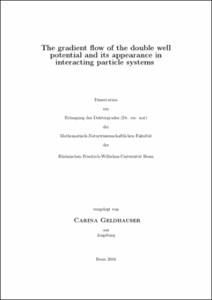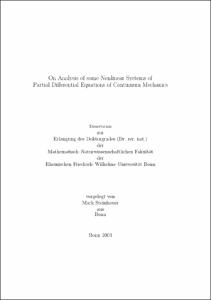Effective Evolution Equations from Many-Body Quantum Mechanics

Effective Evolution Equations from Many-Body Quantum Mechanics

| dc.contributor.advisor | Schlein, Benjamin | |
| dc.contributor.author | Benedikter, Niels Patriz | |
| dc.date.accessioned | 2020-04-19T22:10:03Z | |
| dc.date.available | 2020-04-19T22:10:03Z | |
| dc.date.issued | 23.05.2014 | |
| dc.identifier.uri | https://hdl.handle.net/20.500.11811/6091 | |
| dc.description.abstract | Systems of interest in physics often consist of a very large number of interacting particles. In certain physical regimes, effective non-linear evolution equations are commonly used as an approximation for making predictions about the time-evolution of such systems. Important examples are Bose-Einstein condensates of dilute Bose gases and degenerate Fermi gases. While the effective equations are well-known in physics, a rigorous justification is very difficult. However, a rigorous derivation is essential to precisely understand the range and the limits of validity and the quality of the approximation. In this thesis, we prove that the time evolution of Bose-Einstein condensates in the Gross-Pitaevskii regime can be approximated by the time-dependent Gross-Pitaevskii equation, a cubic non-linear Schrödinger equation. We then turn to fermionic systems and prove that the evolution of a degenerate Fermi gas can be approximated by the time-dependent Hartree-Fock equation (TDHF) under certain assumptions on the semiclassical structure of the initial data. Finally, we extend the latter result to fermions with relativistic kinetic energy. All our results provide explicit bounds on the error as the number of particles becomes large. A crucial methodical insight on bosonic systems is that correlations can be modeled by Bogoliubov transformations. We construct initial data appropriate for the Gross-Pitaevskii regime using a Bogoliubov transformation acting on a coherent state, which amounts to studying squeezed coherent states. As a crucial insight for fermionic systems, we point out a semiclassical structure in states close to the ground state of fermions in a trap. As a convenient language for studying the dynamics of fermionic systems, we use particle-hole transformations. | |
| dc.language.iso | eng | |
| dc.rights | In Copyright | |
| dc.rights.uri | http://rightsstatements.org/vocab/InC/1.0/ | |
| dc.subject | Vielteilchentheorie | |
| dc.subject | Quantendynamik | |
| dc.subject | Quantentheorie | |
| dc.subject | Quantenmechanik | |
| dc.subject | Bose-Einstein-Kondensat | |
| dc.subject | nichtlineare Schrödinger-Gleichung | |
| dc.subject | Gross-Pitaevskii-Gleichung | |
| dc.subject | Hartree-Fock-Gleichung | |
| dc.subject | kohärente Zustände | |
| dc.subject | mathematische Physik | |
| dc.subject | Many-body theory | |
| dc.subject | Quantum dynamics | |
| dc.subject | Quantum theory | |
| dc.subject | Bose-Einstein condensation | |
| dc.subject | dilute Bose gas | |
| dc.subject | degenerate Fermi gas | |
| dc.subject | nonlinear Schrödinger equation | |
| dc.subject | Gross-Pitaevskii equation | |
| dc.subject | Hartree-Fock equation | |
| dc.subject | TDHF | |
| dc.subject | Bogoliubov transformation | |
| dc.subject | squeezed coherent state | |
| dc.subject | particle-hole transformation | |
| dc.subject | semiclassical techniques | |
| dc.subject | semiclassical analysis | |
| dc.subject | mathematical physics | |
| dc.subject | time-depedent Hartree-Fock equation | |
| dc.subject.ddc | 510 Mathematik | |
| dc.title | Effective Evolution Equations from Many-Body Quantum Mechanics | |
| dc.type | Dissertation oder Habilitation | |
| dc.publisher.name | Universitäts- und Landesbibliothek Bonn | |
| dc.publisher.location | Bonn | |
| dc.rights.accessRights | openAccess | |
| dc.identifier.urn | https://nbn-resolving.org/urn:nbn:de:hbz:5n-36006 | |
| ulbbn.pubtype | Erstveröffentlichung | |
| ulbbnediss.affiliation.name | Rheinische Friedrich-Wilhelms-Universität Bonn | |
| ulbbnediss.affiliation.location | Bonn | |
| ulbbnediss.thesis.level | Dissertation | |
| ulbbnediss.dissID | 3600 | |
| ulbbnediss.date.accepted | 30.04.2014 | |
| ulbbnediss.institute | Mathematisch-Naturwissenschaftliche Fakultät : Fachgruppe Mathematik / Institut für angewandte Mathematik | |
| ulbbnediss.fakultaet | Mathematisch-Naturwissenschaftliche Fakultät | |
| dc.contributor.coReferee | Conti, Sergio |
Files in this item
This item appears in the following Collection(s)
-
E-Dissertationen (4086)







